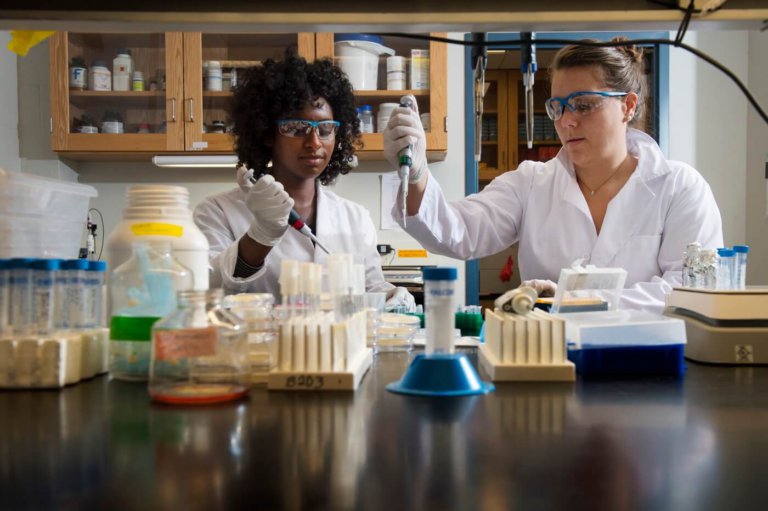
In 2020, pathogens exchanged through the air swept the globe in a matter of months — breaking records for infections and deaths in the process. In a pre-COVID world, most of us already understood how crucial the roles of healthcare workers were. What the pandemic really brought to light was how vital scientists are.
Scientists have been at the forefront of understanding the origins of the virus, how it is spread and what treatments are most effective. Ultimately it’s these individuals that will provide the world with an “exit strategy” from the crisis.
The US Bureau of Labour Statistics reports that employment in life, physical, and social science occupations is projected to grow 5% from 2019 to 2029, faster than the average for all occupations, resulting in about 68,200 new jobs. They also reported an increase in demand particularly in occupations involved in biomedical research, psychology, energy management, and environmental protection.
If you are on the lookout for an institution that focuses on action, exploration, discovery, active participaction and the benefits of earning by doing – these top US colleges of science measure up:
Northeastern University College of Science
Located in the historical city of Boston, Massachusetts, Northeastern University (NU) College of Science (COS) offers distinguished programmes in fields that are at the forefront of discovery, invention, and innovation. The school’s strengths lie in its unique experiential learning approach, bolstered by its robust research culture.

Source: Northeastern University – College of Science
Central to this is its cooperative education (co-op) programme, an experiential learning opportunity to explore potential career paths while acquiring the skills and knowledge needed to succeed.
Northeastern works with over 3,000 employers globally across a variety of industries, including big pharma, energy, and agriculture. Periods of full-time work — up to 18 months — are integrated within the curricula to ensure students develop professionally. They make industry connections while broadening their perspectives and skillset. Unsurprisingly, 93% of NU graduates are employed or enrolled in graduate school nine months after graduation (multi-year average).
COS offers numerous master’s degrees which can be taken online, on-site, or in the evenings to cater to busy professionals. Their full-time MS in Applied Mathematics programme, for instance, is ideal for students who want to work in the financial services and investment firms. The programme also offers a data science track and covers the latest mathematics applications while rediscovering established techniques.
Those who want to carve themselves a career in biotechnology or pharmaceuticals can choose from six concentrations with the online MS in Bioinformatics programme, which combines studies in biology, computer science and IT. There are also real-world experiences of up to six months of co-op work or an industry project incorporated. The MS in Biotechnology programme has 10 concentrations; the curriculum combines advanced interdisciplinary training in biology, chemistry, chemical engineering, and pharmaceutical science, along with business skills to ensure workplace success.
Aspiring environmental professionals will find COS’s MS in Environmental Science and Policy programme ideal. The programme is flexible and customisable; graduates will develop the expertise to professionally identify underlying causes of environmental problems to help decision-makers address these critical challenges. Click here to learn more about this top-tier, R1 status institution.
Johns Hopkins University Krieger School of Arts and Science
Johns Hopkins University (JHU) was established in 1876 as the nation’s first research university and today, the Krieger School of Arts and Sciences carries on its legacy, dedicated to discoveries that create new forms of knowledge and solutions that ultimately better the world. In Baltimore, Maryland, a world renowned-faculty strives to engage students in interdisciplinary teachings across disciplines of arts and humanities, the social sciences, and the natural sciences.

Source: Shutterstock
When it comes to natural sciences, the options are plenty. Aspiring science students will be able to choose between departments of biology, biophysics, chemistry, cognitive science, earth and planetary sciences, mathematics, physics & astronomy and psychological and brain sciences. The college also offers programmes in behavioural biology, molecular biophysics and neuroscience.
What makes JHU the perfect place for aspiring science graduates who want to learn with their hands? For over 140 years, faculty members have worked alongside students to improve lives through research findings. Together, they made water purification possible, launched the field of genetic engineering and authenticated the Dead Sea Scrolls. They are the inventors of saccharine and even CPR. This university was built on research and will continue to grow with its help.
UC Berkeley Rausser College of Natural Resources
At UC Berkeley’s Rausser College of Natural Resources, over 120 faculty members, 2,200 undergraduate and 500 graduate students are learning how every aspect of the environment intersects and supports each other. The goal is to identify what the world needs most, so they can do more of it.

Source: Shutterstock
Here, 21st century issues are prioritised. From sustainable food systems to obesity, from water policy to energy policy, and from the far-reaching impacts of climate change to the linkages between the human genome, diet, and diseases — all are explored here. Apart from learning about the world’s biggest challenges, students at Rausser College gain the knowledge to create solutions.
Graduate programmes encompass several areas, including energy and resources, environmental science, policy and management as well as metabolic biology and metabolic toxicology. Teaching these courses are Rausser educators, who are some of the best in the country – racking up achievements that cannot all be mentioned. To get the jist, among the list are four Nobel laureates affiliated with the 2007 Nobel Prize for the Intergovernmental Panel on Climate Change, three Wolf Prize Winners, seven MacArthur Fellows, 19 National Academy of Sciences Members, 30 American Association for the Advancement of Science Fellows, nine American Academy of Arts and Sciences Members and 40 Fulbright Fellows.
NYU College of Arts and Science
Every admission cycle, the NYU College of Arts and Science (CAS) receives approximately 40,000 applications. Students all over the world flock to this college for programmes taught by faculty members who have won awards ranging from the Guggenheim and the Pulitzer Prize to the Nobel Prize. Located in the city that never sleeps, CAS offers over 60 majors and 60 minors in the humanities, social sciences and the natural and computational sciences.

Source: Stutterstock
Co-curricular engagement is also valued. CAS students are given ample opportunities to participate in an array of activities, programmes, internships, mentorships and research experiences that add value to the qualifications they are working towards.
Alongside their studies, students here are lucky enough to gain hands-on experience from a very active research community. For example, the Department of Chemistry’s research spans disciplines such as organic, inorganic, physical and theoretical/computational chemistry. Additionally, the Department of Biology covers areas such as genomics and systems biology, developmental genetics, molecular and cellular biology, computational biology, infectious diseases and the microbiome, evolution and ecology.
*Some of the institutions featured in this article are commercial partners of Study International







